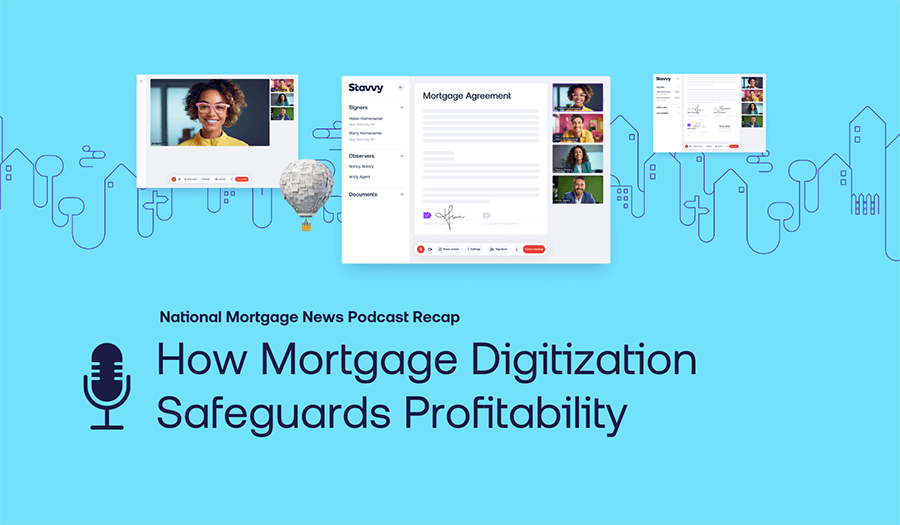It is probably no surprise that closing on a mortgage digitally gained significant traction during the height of the COVID pandemic. However, years later, this digital trend continues to gain popularity every day as a better way for lenders and title agents to become more operationally efficient and deliver a better real estate customer experience.
According to Pew Research, about 30% of US adults are almost constantly online. Thanks to the introduction of the internet and online shopping, shopping preferences have changed drastically over the years. At Stavvy, we believe the same can be said for real estate purchases and mortgage transactions. Traditional in-person closings are becoming a thing of the past, making way for more digital closing options. But this shift benefits more than just homeowners.
The mortgage industry has always been a people business—a business rooted in the connection and collaboration of homeowners, lenders, title agents, lawyers, realtors, and online notaries. Today, that means working with mortgage stakeholders where they are most comfortable—online.
Enter mortgage eClosings—or in other words, a digital approach to the traditional mortgage closing process.
At Stavvy, we talk a lot about the rise of remote online notarization (RON), and eClosings being the mortgage industry's future. Throughout this blog, we explain eClosings, including the various types of eClosings, and the benefits of investing in an eClosing platform.
What is eClosing?
An eClosing is the digital approach to a traditional, pen-and-paper mortgage closing where some or all closing documents are executed and accessed electronically. Below we break down common eClosing types.
Hybrid eClosing
A hybrid eClosing occurs when a signer signs some of the required loan closing documents using pen and paper and the remaining documents via electronic signature.
Hybrid eClosing with eNote
A hybrid eClosing with eNote is a hybrid eClosing where the mortgage note is included as part of the documents signed electronically.
eClosing with in-person electronic notarization (IPEN)
An eClosing with IPEN is an eClosing where the notarized documents within a mortgage file are signed and notarized electronically during an in-person closing ceremony. The signer and notary are together in the same location, and the notary uses technology to apply a digital notarial seal to the signed documents.
eClosing with remote online notarization (RON)
An eClosing with RON is the most convenient method of eClosing where the notarized documents within a mortgage file are signed and notarized remotely, allowing all parties to meet virtually using audio-visual technology. Similar to eClosing with IPEN, the platform allows the notary to apply a digital notarial seal to the digital documents upon execution.
Click here to read our complete guide to remote online notarization
What are the benefits of eClosing platforms?
Mortgage eClosings benefit title and settlement agents, real estate attorneys, lenders, and homeowners. Below are the top six benefits of eClosing platforms:
Benefit #1: Convenience
With an eClosing solution, lenders can offer customers a convenient option for electronically signing their closing documents. The homeowner's mortgage closing documents are available in a single secure location and easily accessible to everyone involved in the mortgage transaction. With mortgage documents available to view, sign, and notarize digitally, shipping and document loss are no longer an issue, operating cost, or a risk to the mortgage closing process.
Benefit #2: Cost and time savings
According to McKinsey and Company, in 2021, the average loan origination cost was $7,000-$9,000. Due to manual loan processing and underwriting, on average, 10-14 mortgages are closed per full-time employee per month, resulting in an average closing time of greater than 45 days, significantly impacting customer satisfaction levels. Mortgage eClosing capabilities can lower the cost to close a loan, ultimately decreasing origination costs for lenders. In addition, digital closing options can speed up the overall closing process and delight homeowners on closing day.
Benefit #3: Security
All mortgage closing documents and consumer information are stored on a secure platform with multi-factor authentication (MFA) and digital audit trails so you can spot altered information and understand who has viewed and executed each document.
Benefit #4: One source of digital truth
Digital mortgage platforms, like Stavvy, allow you to close a mortgage from a single tool. Investing in and implementing one platform versus a mirage of tools helps you omit manual work, easily hit closing dates, and boost office productivity and potential revenue.
Benefit #5: Fewer delays and errors
With an eClosing solution, there’s no need to stare and compare mortgage documents. eClosing technology creates less room for errors, easily detects discrepancies, and allows you to do more accurate closings.
Benefit #6: Better closing experience
With eClosings, you don’t need to travel, spend unnecessary time or money, or deal with the back and forth of physical documents. A digital approach to mortgage closings, whether a hybrid eClosing or full eClosing, provides a faster and better experience than traditional methods.
What to look for in an eClosing platform?
While transitioning from traditional closing to eClosing has advantages, there are a few things you should consider.
At the bare minimum, eClosing technology should be MISMO® compliant, have security measures in place to ensure data protection, and include industry compliance guardrails.
An eClosing platform should be user-friendly and include industry-specific features like eSignature, IPEN, RON, digital audit trail, document management, and audio-visual communication, to name a few.
But perhaps most importantly, the eClosing platform should work for you as the end user. We strongly encourage mortgage professionals to align with a product that offers access to supportive implementation, training, and customer success teams committed to your eClosing success.
Making a case for mortgage eClosings
Any opportunity to support your homeowners and business partners, save money, and lessen the burden on your staff is an opportunity to grow your business. Mortgage eClosings create so many of these moments by allowing you to meet people where they are and where they feel most comfortable. Whether it’s electronic signatures, remote online notarization, in-person electronic notarization or all of the above, digitizing the closing process is an invaluable way to dazzle homeowners, decrease operational costs, and rid yourself of the headaches of manual, paper-based closings.
Learn more about how the  is taking real estate beyond documents.
is taking real estate beyond documents.



![[Webinar Recap] Advancing Your Digital Default Servicing Strategy](https://blog.stavvy.com/hubfs/advancing-your-digital-default-servicing-strategy-blog-recap.png)